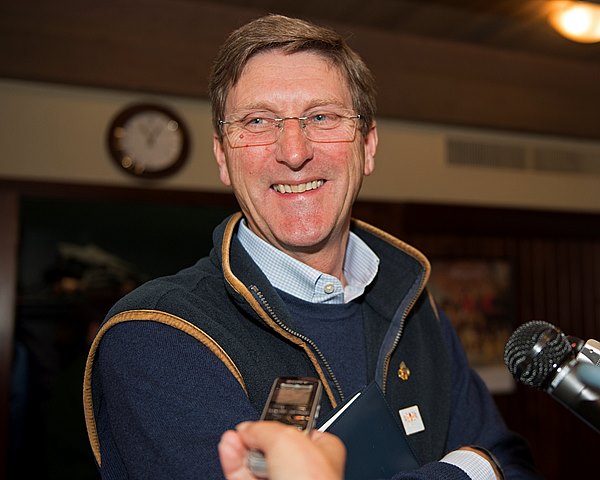BHA Chair Implores Racing to Accept Welfare Scrutiny


British racing has been warned that the issue of racehorse welfare will not be going away whatever the result of the general election and that the sport risks having change forced upon it if it does not open up to greater external scrutiny.
The message came from British Horseracing Authority chair Annamarie Phelps, who was speaking at the 249th Gimcrack Dinner at York Racecourse Dec. 10.
She also told guests that the controversial review of the bloodstock sector carried out by the BHA would be published before Christmas.
Racehorse welfare has been mentioned in both the Labour and Liberal Democrat manifestos in the lead-up to the Dec. 12 poll.
Phelps said: "The sport's right to regulate itself on horse welfare has been challenged by two of the main U.K. parties in this election, with one focused on the issue of the whip.
"Whoever wins or loses, this challenge isn't going away. If racing wants to retain self-regulation, it will need to show, in my view, greater external scrutiny of horse welfare standards. If racing doesn't ensure this, it may be forced upon us."
Phelps said the sport's new Horse Welfare Board would be publishing its industry strategy in the new year and that it would show racing "to be leading, not reacting to the conversation, about the participation of horses in sport."
She warned the strategy would challenge all in racing, including the BHA, adding: "If we were all entirely comfortable with it, we wouldn't be pushing ourselves hard enough.
"If we want to change people's attitudes and win over those who are neutral about racing—at the very least, ensure they are not won over by our critics—we need to be doing something different.
"But doing something different is not always comfortable or easy. This is an opportunity to get on the front foot—demonstrating that the power of racing is matched by the responsibility we take for our horses."
The BHA has been criticized for its approach to equine welfare by other stakeholders in the sport, but Phelps argued the governing body is well respected in government and across sport integrity circles.
"Our focus early next year will undoubtedly be to identify new supporters from the 150-plus new MPs we expect to see and ensure our voice is heard on everything from Brexit to betting," she said.
The BHA has also come in for criticism over regulation, and its potential involvement in regulation of the bloodstock sector has also raised tensions.
The governing body commissioned a review and report into the buying and selling of horses, but anger among some sections of the industry over what they claim were leaks of the review's findings have led to the BHA being frozen out of meetings held by the Bloodstock Industry Forum, which contains representatives of breeders, agents, owners, trainers, and the two major sales houses.
Phelps' comments suggested that situation remained the case, and she held out an olive branch.
"Some want us to be more involved in protecting buyers at the sales," she said. "Mind you, some of you don't believe it is necessary at all. Whichever side of the fence you sit on, we will publish the review we did of the buying and selling of horses before Christmas.
"Our board will decide whether we play a role in providing assurance to buyers at the sales when we see what actions the Bloodstock Industry Forum is proposing to take.
"The onus must now be on the forum to decide if it wants the BHA involved in maintaining the confidence of their customers. We're ready to assist."
Richardson Urges Racing to Unite in Challenging Times
Chris Richardson, managing director of Cheveley Park Stud, has urged racing's many factions to unite and move forward as one as it faces up to a challenging period for the sport.
On behalf of Cheveley Park's David and Patricia Thompson, owners of this year's prestigious Al Basti Equiworld Dubai Gimcrack Stakes winner (G2) Threat, Richardson was giving the traditional owners' speech at the 249th Gimcrack Dinner at York Racecourse on Tuesday night, attended by 170 invited guests from the racing world.
As well as urging racing to unite, Richardson was keen to highlight the "significant contribution" owners of all sizes make to the industry, as well as highlighting the "Thoroughbred and its future" as the most important consideration at all times.
"It seems to us that the biggest problem facing British racing today remains a lack of unity," Richardson said. "The racing 'product' is dependent upon different interest groups, in many cases with understandable but often conflicting responsibilities to shareholders and others who have no close connection to, or passion for, racing.
"Commercial pressures dictate a short-term view among many participants that does not sit comfortably with our role as the present custodians of the Thoroughbred racehorse, a creature fashioned by man over 2 1/2 centuries and now, to a sadly increasing number of 'stakeholders,' a commodity bred to serve a swollen betting market that has seen the fixture list grow commensurately."

Richardson, who recalled 1975 Gimcrack winner Music Boy—who carried the same silks as Threat to victory—as the start of Cheveley Park's success story, added: "The cricketing legend, Michael Holding, was once quoted as saying: 'You can't change racing, you can just have less of it and make people more welcome.' Middle stump.
"Fortunately, there still remains a core of participants in the industry with a common goal, and if we place the Thoroughbred and its future at the heart of an industry-wide recovery plan, the next half-century may begin to look rosier than perhaps it does now.
"A vibrant, united industry, growing on the rewards of its own income streams, not selling itself too cheaply to outside interests, will benefit all its participants. The unity needs to start now."
